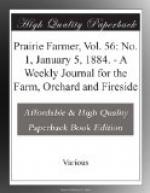Oh, in that wonderfu’,
wonderfu’ meeting,
What shall I say
to him? what will he say?
We shallna weary life’s
story repeating,
Seeing the end
o’ the sorrowfu’ way.
With such a hope, then, how
could I say truly,
“Robin,
dear Robin, come back unto me!”
Heart, answer the thought
sae wild and unruly,
“Robin,
dear Robin, I shall come unto thee!”
—Harper’s Weekly.
MRS. WIMBUSH’S REVENGE.
(Concluded from last week.)
It was a large picnic party. Mr. Charles Brookshank had drawn Mrs. Wimbush’s arm through his own, and strolled away from the rest.
“How delightful it would be if one could know the language of birds, as folks did in the old Hindu fairy tales! Would it not, Mr. Brookshank?”
“My dear Mrs. Wimbush, they do nothing the whole day long but make love and cry ‘Sweet, sweet!’ I would I were a bird, to make love in music.”
The widow sighed, but it was more like a purr of pleasure.
“What did I know of love till you came here?” continued Mr. Charles. “Absolutely nothing—except,” he added, with reservation, “in a professional way. And then we lawyers generally see the dark side of the picture—the damages and the decrees nisi. But your visit has brightened my whole life. O Mrs. Wimbush, you can not have been blind to my secret! You have seen it written legibly in my face, and have not interposed to check its development. I see you understand me, just as by intuitive fine feeling you can penetrate the meaning of Mendelssohn’s Songs without Words. Mrs. Wimbush, you have already far advanced toward learning the birds’ language. I may rely upon your consent?”
“Charles, this happiness is indeed too much,” ejaculated the widow.
“You need never be separated from your daughter Carry. A home for one is a home for both; and I will cherish her while I live.”
“But, Charles dear, she may marry.”
“Marry, ma’am? Bless my soul, of course she will! She will marry me! She has said so, don’t you see?”
Mrs. Wimbush never said another word, but fell flat down upon the grass.
“What on earth has got the woman?” thought Mr. Charles. “She couldn’t have taken it worse if I had proposed to murder her daughter.”
In their walk they had strayed through the trees close to the outskirts of another picnic party. Mr. Charles immediately ran to ask some fair volunteer to come to the assistance of Mrs. Wimbush, who had fainted. At hearing the name, an active middle-aged lady sprang up and followed him. It was Mrs. Marrables. The sight of her mother brought Mrs. Wimbush round quicker than any smelling bottle could have done. She sat up.
“Mother, Mr. Brookshank; Mr. Brookshank, my mother, Mrs. Marrables.” They bowed. “Have the goodness to leave us together, Mr. Charles.” He bowed and obeyed. “Mother,” said Mrs. Wimbush, “what on earth brought you here? I thought you were at Taunton.”




